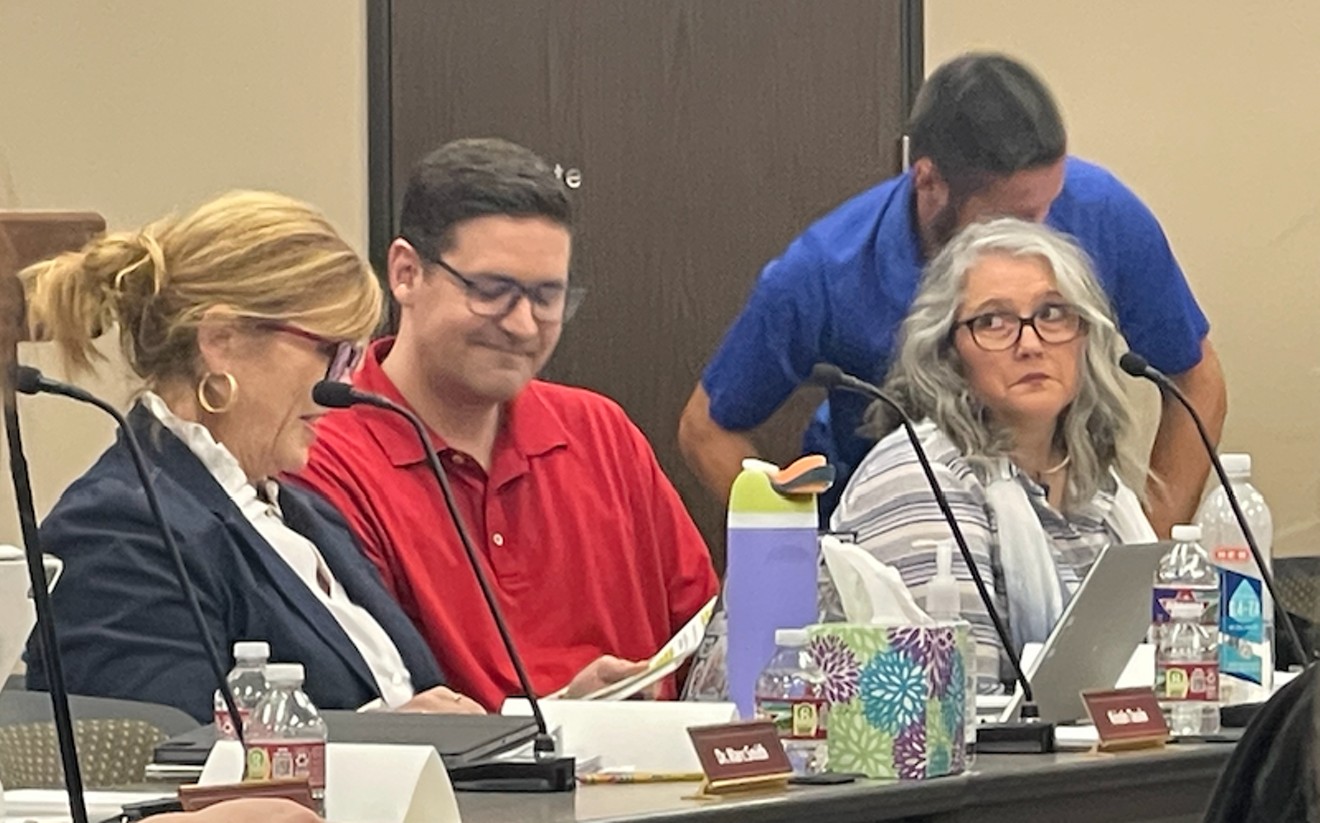During Wednesday’s workshop meeting, Darcey Pett, an Austin Parkway Elementary 2023-2024 teacher of the year, was reduced to tears and clutched a Kleenex as she urged the board to reconsider the drastic changes.
Pett spoke against the drafted policy updating the district’s book selection and reconsideration process. The modifications introduced by trustee David Hamilton and backed by fellow trustee Sonya Jones in April would curb the requirement of using a formal reconsideration committee to review a challenged text.
The revised measure would instead give Superintendent Dr. Marc Smith the authority to retain, remove or restrict a book.
“Our educators and campus librarians are trustworthy experts in their fields. They’re trained professionals with a deep understanding of child development and educational needs,” Pett said. “Please trust us to do the jobs we were hired to do and give more educators and librarians a seat at the table.
“Relying on one individual to review all the books for all age groups, based on their educational suitability, overlooks the complexity of evaluating literature,” she added. “Without our expertise, students may miss out on valuable learning opportunities and exposure to diverse perspectives that enrich their minds and promote intellectual growth.”
The current policy indicates that once a request for formal review of a book is filed, the challenge is assigned to a five-to-seven-member committee that includes district administrators, at least one instructor and other staff members.
Angie Wierzbicki, a mother of two students in the district, suggested that adding parents to these committees — not getting rid of this step in the review process — would likely be a change the community would support. She questioned why they had not served on them before.
“This is vital for preserving parental rights,” Wierzbicki, who voiced her opposition to the revisions, said. “I think most parents in this district would appreciate having a voice.”
Wierzbicki and other community members also criticized the way these texts are analyzed using a rubric that evaluates excerpts of a work rather than it as a whole and committee members’ making decisions without reading texts in their entirety as required.
“It’s very easy to tear words from context. It’s the lowest form of intellectual laziness and deceit. People who support book bans know that context matters,” Scott Pett, Rice University professor and husband to Darcey, said. “It’s just that they don’t like the context of the books that they opposed.”
“It’s not the words they dislike. It is the context of those words,” he added. “Stories about people who were dehumanized and othered and under-recognized.”
These committees then determine whether to keep, limit access to or take titles off library or classroom shelves based on this evaluation. Once a decision is made about a book, the individual who filed the challenge can accept the choice or appeal it to the board.
The trustees have the ultimate say over the outcome of a book in both the current policy and the revised draft.
Before the discussion among trustees and district employees ramped up, newly elected Board President Kristin Tassin, addressed a line of educators sitting in the front row of the audience.
“I want to make very clear from myself, and on behalf of the board of trustees that we support, we respect and rely very heavily upon our librarians as an important part of our educational team,” Tassin said. “It is my intent this evening personally, and as the board president, and as we deliberate to honor your work and honor your profession.”
Tassin then told those at the workshop that she wanted to clarify the superintendent's role as outlined by the proposed alterations. She explained that the board would delegate the authority to Smith, who could exercise his power directly or convene a reconsideration committee to help inform him of his decisions regarding challenged titles.
Hamilton stuck to his guns, saying this main change was needed because the presence of what he referred to as egregious, degenerative content in the district was a much more severe issue than he initially thought it was.
He echoed arguments made in prior meetings, saying librarians could not remove these titles immediately because they had to wait for a formal reconsideration request to initiate the steps to potentially remove them from the shelves.
Administrators stepped in responding to Hamilton's comments, saying that audits to inspect materials to ensure that content aligns with the district’s policy on harmful, obscene content are conducted to evaluate titles that may need to be removed.
The district conducted one of these audits on graphic novels, removing roughly 70 books, in 2023. The next section to be evaluated is the district’s fiction collections.
Melissa Hubbard, the executive director of teaching and learning, added that librarians also can “weed out” or take books that may be outdated or not widely checked out by students off the shelves.
As previously reported by the Houston Press, one district employee who requested anonymity said she felt that Hamilton first proposed these alterations in response to an unsuccessful attempt to remove one title featuring sex-trafficking content from the high school level without following the formal process.
The employee added that Hamilton thought he could email Smith and that the book would be removed from the library and classroom shelves. However, all but one of the seven librarians who reviewed it individually with their district coordinators — outside of an official committee — decided against removing it.
She said she thought the decision to uphold the title likely upset Hamilton. Hamilton’s further motivation to institute revisions to the policy could also be reflected in this year’s requests for reconsiderations of books within the district.
Tassin noted that if approved, the process they were establishing was for constituents and community members. Tassin indicated that anybody could take advantage of it, including trustees, but that under no circumstance should board members be able to go to Smith directly to tell him a book needed to be removed.
According to documents obtained by the Houston Press, Hamilton himself submitted all 35 requests filed this year. In a recent television interview, Hamilton said he could not get other community members to fill out reconsideration requests because others did not want to be called a “book banner.”
In the formal review requests Hamilton submitted, he took issue with what he referred to repeatedly as “blasphemous” content, including material that he said would be offensive toward most religious people. He also opposed any reference to sexual activity, abortion and other controversial subjects.
In the line of the forms where Hamilton was asked to indicate whether he read the full text, he commonly wrote, "No, I’ve read enough of it,” or cited BookLooks. This nonprofessional website offers no information regarding who determines the ratings of titles or whether those rating the books are qualified to do so.
Despite being described as an objective source, the operators of the book-rating platform, Emily and Jonathan Maikisch, have ties to the right-wing group Moms For Liberty.
Moms for Liberty is a national organization with local chapters that promotes book bans in school libraries, endorses school board candidates who reflect the group’s conservative values and advocates against content that features the LGBTQ community or references critical race theory.
Emily used to be a member of Moms For Liberty, but she clarified on the BookLooks website that she left the group in 2022 to launch BookLooks. Despite this claim, BookLooks’s rating system is nearly identical to the one used by Moms for Liberty chapters. A link to BookLooks is also featured as a book resource for parents who are a part of the national organization.
BookLooks was the only source Hamilton used to challenge the content within the books he requested to be reconsidered. When asked what type of material Hamilton would want these titles replaced with, he wrote that he would replace these books with literature that, in his opinion, is not blasphemous, explicitly sexual, and in some cases radically pro-abortion or that fantasized about killing Christians.
He wrote that retaining two titles in particular, Rumble by Ellen Hopkins and The Year of The Flood by Margaret Atwood, would result in students possibly deciding to murder Christians, then serving long prison sentences and creating “perverted, twisted” children, respectively.
While Tassin remained on the topic of feedback regarding reconsideration committees, comments made by recently elected trustee Adam Schoof, who serves on the policy committee with Hamilton and trustee Angie Hanan, veered toward concentrating on content, too.
Schoof asked the district’s legal counsel whether the librarians would be held criminally liable if material with content that went against the Texas penal code snuck through the reconsideration process. The counsel hesitated, citing the hypothetical nature of his question, but noted that if librarians did not know the material was inside the library, they would likely not face criminal exposure. Instructors in the crowd let out a string of exasperated sighs at Schoof's comments.

Trustee Adam Schoof said he agreed with trustee Rick Garcia's suggestion for challenged books to be put under restriction until approved.
Photo by Faith Bugenhagen
She also prompted her fellow trustees to think about how Smith could face pressure from anyone. Trustee Dr. Shirley Rose-Gilliam requested that the trustees who supported the measure think long and hard about the position they would be putting the superintendent in.
Tassin said she struggled because she thought the committee was what the district needed and should convene in almost every circumstance. However, she noted that giving authority to a committee did not fit with anything else the trustees did.
Tassin added Smith having the power to choose to defer to a committee for guidance in his decision-making process would align with the board’s typical operations as they assign authority and responsibility for virtually everything in the district to him.
Smith stressed the importance of always having more than one voice at the table when making weighted decisions such as these.
“The way I process this at this stage of the process we are having the workshop is that in most, if not all, scenarios, I see myself exercising the authority to convene a committee,” Smith said. “So that I can ensure that I have the proper feedback from all the experts.”
The instructors present nodded their heads in approval of Smith's statements, and they looked relieved as the superintendent shared his plans for navigating the authority these changes would give him.
After roughly three hours of discussion, the meeting adjourned. The board is set to take a vote on changes to the policy sometime this summer. The district’s next regular board meeting is Monday, June 10. The agenda for the meeting will be released on Friday and indicate whether trustees plan to take action on the revised measure.







